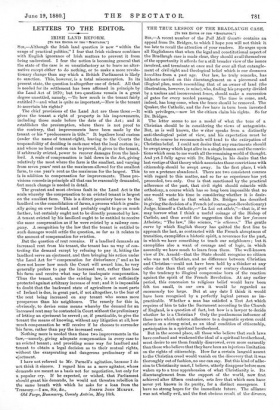THE TRUE LESSON OF THE BRADLAU GH CASE.
Tas Eorroe or THE SPEOTITOR."J Sra,—A recent number of the Pall Mall Gazette contains an appeal from Dr. Bridges, to which I hope you will not think it too late to recall the attention of your readers. He urges upon all Englishmen that when the legal and constitutional aspect of the Bradlaugh case is made clear, they should avail themselves of the opportunity it affords for a still broader view of the issues involved, and terminate at once and for ever all that entangle- ment of civil right and theological belief which is our damnosa hereditas from a past age. Our law, he truly remarks, has hitherto carried on this disentanglement on a piecemeal and illogical plan, much resembling that of an owner of land (the illustration, however, is mine), who, finding his property divided by a. useless and inconvenient fence, should make a succession of gates for every needed passage. The time is come, and, indeed, has long come, when the fence should be removed. The Quaker, the Catholic, and the Jew have in turn been invested, with privileges,—now let the citizen claim his rights. So far Dr. Bridges.
The letter seems to me a model of what the tone of a Christian should be in considering the views of antagonists. But, as is well known, the writer speaks from a distinctly anti-theological point of view, and his expectation must be that the course be recommends will tend to the extirpation of Christian belief. I could not desire that any enactments should be swept away which kept alive in a single human soul the convic- tions which seem to me worth all the remaining world of thought. And yet I fully agree with Dr. Bridges, in his desire that the last vestige of that theory which associates those convictions with citizenship should be swept away. In the first place, I wish to see a pretence abandoned. There are two consistent courses with regard to this matter, and so far as experience has yet proceeded, two only. One is that sanctioned by the practical adherence of the past, that civil right should coincide with- orthodoxy, a course which has so long been impossible that no one would waste his time in considering whether it is desir- able. The other is that which Dr. Bridges has described in giving the decision of a French (of course,post-Revolutionary) Judge, himself a Catholic,—" La Loi est athee,"—that is, if we may borrow what I think a useful coinage of the Bishop of Carlisle, and thus avoid the suggestion that the law favours Atheists; "The law," like science, "is atheous." The gentle curve by which English theory has quitted the first line to approach the last, as contrasted with the French abruptness of transition, exemplifies a historic spirit, a reverence for the past, in which we have something to 'teach our neighbours ; but it exemplifies also a want of courage and of logic, in which assuredly we have much to learn from them. The well-known view of Dr. Arnold—that the State should recognise no citizen who was not Christian, and no difference between Christian and Christian—could not have been held by a thinker at any- other date than that early part of our century characterised, by the tendency to illogical compromise born of the reaction against the spirit of the French Revolution. At any earlier period, this concession to religious belief would have been felt too small, in our own it would be regarded as enormously too large. But at any date I think it would have been recognised by a perfectly logical person as im- practicable. Whether a man has satisfied a Test Act which requires of him to take the Sacrament according to the Church of England, is a question of fact, but how is a lawyer to decide whether he is a Christian ? Only the posthumous influence of those laws which enforce adherence to a dogmatic system could enforce on a strong mind, as an ideal condition of citizenship, participation in a spiritual brotherhood.
But in the second place, all those who believe that such laws have confused and weakened the ideal of a spiritual brotherhood, must desire to see them frankly disavowed, even more earnestly than those who believe that they have been an injurious limitation on the rights of citizenship. How far a certain languid assent to the Christian creed would vanish on the discovery that it was thoroughly out of fashion, no one can say. But this kind of adhe- sion to Christianity must, I believe, utterly disappear before men waken up to a true apprehension of what Christianity is. Its disentanglement from the support of the world, now first achieved after fifteen centuries, sets free that which men have never yet known in its purity, for a distinct emergence. / have no strong hopes for the immediate future. The alliance was not wholly evil, and the first obvious result of the divorce,
I expect, will be the increase of that defiant and reckless spirit which it held in check. But I have no fears for the ultimate future. The casting aside of unreal support is an opportunity for discovering actual strength. The hour which deprives us of all those outward props by which we have sought to buttress our faith must teach us that it is to support us, not to be supported by us,—must surely show us, if we have eyes to see, that the laws by which a nation's life is bound to a belief in the invisible "are not of yesterday, but unwritten and



































 Previous page
Previous page